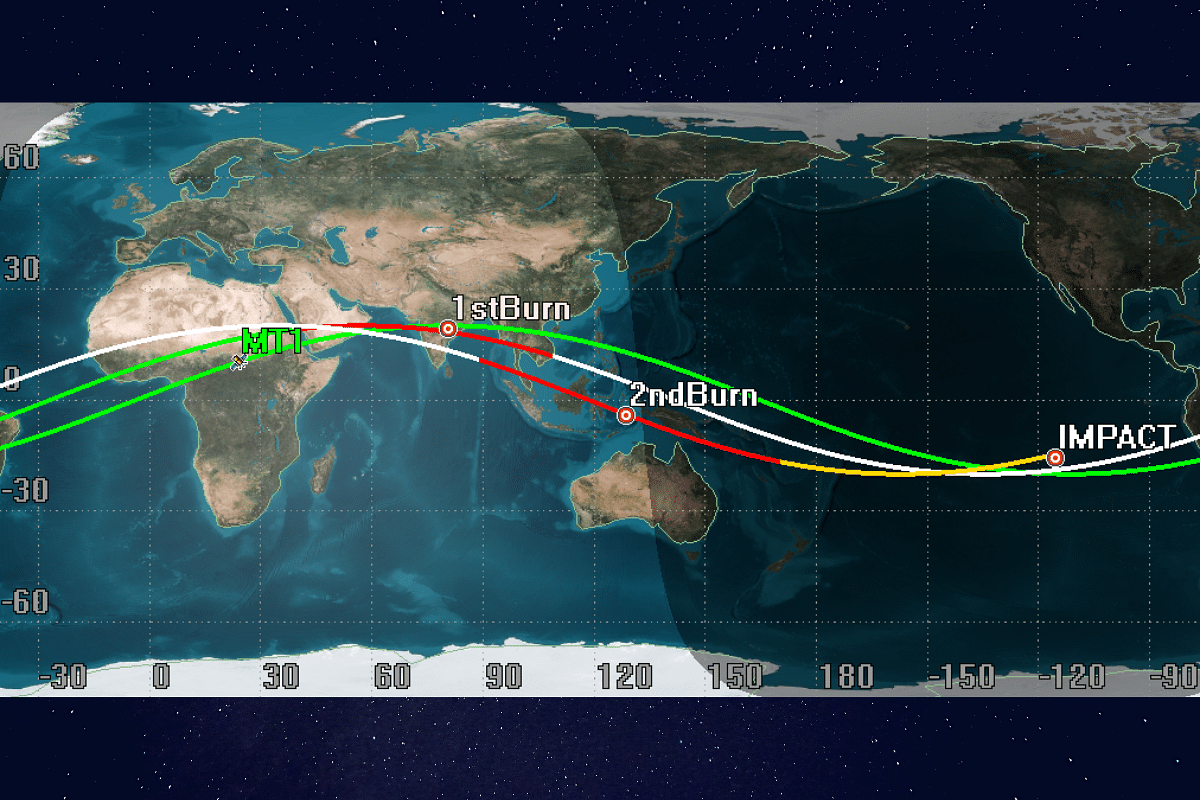Science
Megha-Tropiques-1: ISRO Successfully Executes Controlled Re-entry Of Satellite In Space Debris Mitigation Exercise
- The satellite re-entered the Earth's atmosphere and would have disintegrated over the Pacific Ocean, ISRO confirmed based on telemetry.

Final ground traces of the Megha-Tropiques-1 satellite (Image: ISRO)
The Indian Space Research Organisation (ISRO) successfully pulled off the controlled atmospheric re-entry of its decommissioned climate research satellite Megha-Tropiques-1.
Megha-Tropiques-1 was a joint satellite mission by India and France for studying the water cycle and energy exchanges in the tropics. It was launched in October 2011 and decommissioned in April 2022 after a couple of extensions over its original mission life of three years. (Read this earlier Swarajya report for more details.)
On 7 March 2023, four 11 Newton thrusters on-board the satellite were fired for about 20 minutes each over two de-boost burns at 11:02 UTC (4:32 pm) and 12:51 UTC (6:21 pm) respectively.
“The final perigee was estimated to be less than 80 km indicating that the satellite would enter the denser layers of the Earth's atmosphere and subsequently undergo structural disintegration,” ISRO said in a statement.
The satellite re-entered the Earth's atmosphere and would have disintegrated over the Pacific Ocean, ISRO confirmed based on telemetry.
The remains of the satellite — constituting no large debris fragments, going by the re-entry aero-thermal flux analysis — are estimated to have crashed within the target latitude and longitude parameters in the deep Pacific Ocean.
The entire sequence of events was executed from the Mission Operations Complex at ISRO Telemetry Tracking and Command Network (ISTRAC), Bengaluru.
ISRO passed with flying colours in what it had called “a challenging experiment.”
“The controlled re-entry exercise bears yet another testimony to India's continued efforts towards ensuring the long-term sustainability of outer space activities,” ISRO said, noting that the space agency has been proactive in recent years to better comply with internationally accepted guidelines on space debris mitigation.
Megha-Tropiques-1 was progressively lowered through a series of 20 manoeuvres, taking up 120 kg of fuel, since August 2022.
The entire process of deorbiting the satellite was chalked out after considering various factors — “visibility of the re-entry trace over ground stations, ground impact within the targeted zone, and allowable operating conditions of subsystems, especially the maximum deliverable thrust and the maximum firing duration constraint on thrusters,” ISRO explained.
Extra care was taken to ensure that the decommissioned satellite didn’t get anywhere close to other low-Earth orbiting objects, especially the crewed capsules, such as the International Space Station and China’s Tiangong space station.
Improving Space Awareness
India is building indigenous capabilities for tracking and monitoring space objects with the aim of safeguarding Indian space assets.
Space is becoming an increasingly crowded space, with satellite constellations now beginning to pile on to decades of mounting satellites in space and the resultant space debris.
The ever-rising population of space objects in orbit anxiously lifts up collision risks, posing a serious threat to the safe and sustainable use of outer space. (Check the Kessler effect.)
The ISRO System for Safe & Sustainable Operations Management (IS4OM) is key to India’s space situational awareness and space debris management goals.
The IS4OM facility was inaugurated at Bengaluru-based ISRO Control Centre in July 2022.
It can support all routine operations safeguarding Indian space assets, mitigating collision threats from space objects through specific collision avoidance manoeuvres, and compliance with international guidelines, such as for post-mission disposal and satellites’ end-of-life operations, together with research activities in space debris and space situational awareness.
Support Swarajya's 50 Ground Reports Project & Sponsor A Story
Every general election Swarajya does a 50 ground reports project.
Aimed only at serious readers and those who appreciate the nuances of political undercurrents, the project provides a sense of India's electoral landscape. As you know, these reports are produced after considerable investment of travel, time and effort on the ground.
This time too we've kicked off the project in style and have covered over 30 constituencies already. If you're someone who appreciates such work and have enjoyed our coverage please consider sponsoring a ground report for just Rs 2999 to Rs 19,999 - it goes a long way in helping us produce more quality reportage.
You can also back this project by becoming a subscriber for as little as Rs 999 - so do click on this links and choose a plan that suits you and back us.
Click below to contribute.
Latest